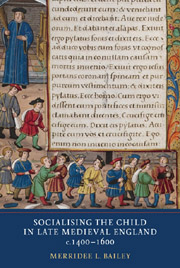Book contents
- Frontmatter
- Contents
- Acknowledgements
- Abbreviations
- Transcription conventions
- Introduction
- 1 Courtesy Poems
- 2 Readers
- 3 Virtue and Vice
- 4 Sixteenth-Century Books
- 5 The School
- Conclusion
- Appendix A Appendix A: English Vernacular Courtesy Poems
- Appendix B Incunabula
- Appendix C Sixteenth-Century Books
- Appendix D Educational Sources
- Bibliography
- Index
- YORK MEDIEVAL PRESS: PUBLICATIONS
5 - The School
Published online by Cambridge University Press: 05 April 2013
- Frontmatter
- Contents
- Acknowledgements
- Abbreviations
- Transcription conventions
- Introduction
- 1 Courtesy Poems
- 2 Readers
- 3 Virtue and Vice
- 4 Sixteenth-Century Books
- 5 The School
- Conclusion
- Appendix A Appendix A: English Vernacular Courtesy Poems
- Appendix B Incunabula
- Appendix C Sixteenth-Century Books
- Appendix D Educational Sources
- Bibliography
- Index
- YORK MEDIEVAL PRESS: PUBLICATIONS
Summary
‘For education properly, is nothing else but a bringing vp of youth in virtue’
In 1502–3, Sir John Percyvale's will revealed the manner in which the endowment of the grammar school in Macclesfield, Cheshire, was to have a longterm socialising effect on scholars ‘whose lernyng and bryngyng forth in Conyng and vertue right fewe Techers and scolemaisters been in that Contre whereby many Children for lak of such techyng & draught in conyng fall to Idlenes And so consequently live disolately all their daies’. His sentiments reflect a commonplace desire among pedagogues, moralising adults and parents that the educational curriculum instil social, moral as well as educational skills in young people.
These sentiments are found in educational institutions elsewhere in pre- Reformation England. The almoner of the almonry and grammar school of St Albans, Hertfordshire, perceived his duties as including the promotion of appropriate table manners: ‘He usually also, for the sake of good manners, not because he is obliged to do so, maintains table-cloths and napkins for the boys' and servants' table there.’ The similarity of these rules to the lessons found in courtesy poems reflects the importance of fashioning an environment, and particularly an elite environment, where good manners, refined behaviour and the exclusive trappings of wealth created material differences in the behaviour of young people.
- Type
- Chapter
- Information
- Socialising the Child in Late Medieval England, c. 1400–1600 , pp. 159 - 193Publisher: Boydell & BrewerPrint publication year: 2012



